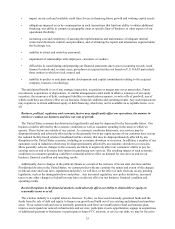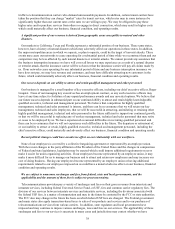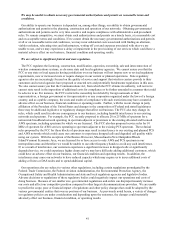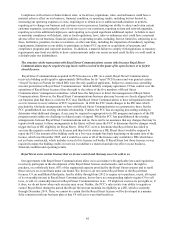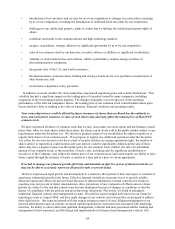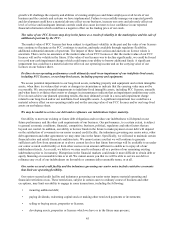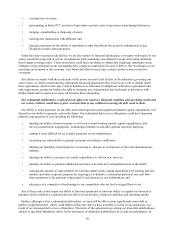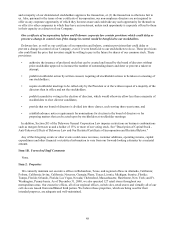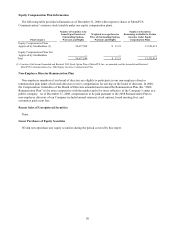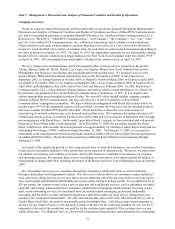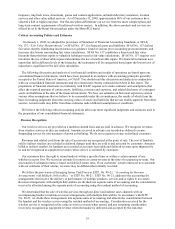Metro PCS 2008 Annual Report Download - page 52
Download and view the complete annual report
Please find page 52 of the 2008 Metro PCS annual report below. You can navigate through the pages in the report by either clicking on the pages listed below, or by using the keyword search tool below to find specific information within the annual report.43
Spectrum for which we have been granted licenses as a result of AWS Auction 66 and Auction 73 is subject to
certain legal challenges, which may ultimately result in the FCC revoking our licenses.
We were required by the applicable FCC rules to pay the full purchase price of approximately $1.4 billion and
$313.3 million to the FCC for the licenses we were granted as a result of Auction 66 and Auction 73, respectively,
even though there are ongoing challenges to some aspects of the final auction rules as they relate to DE participation
in the auctions. Several interested parties are appealing these rules in the U.S. Courts and are seeking, among other
relief, to overturn the results of Auction 66 and Auction 73. We are unable at this time to predict with certainty the
likely outcome of these challenges. If the courts invalidate either auction, we could lose the licenses granted to us as
a result of the auctions and would have no assurance of being able to reacquire the licenses in a subsequent re-
auction. While we would likely receive a refund of the payments made to the FCC for the spectrum should either
auction be overturned, we would not be reimbursed for time, money and efforts spent to clear the spectrum,
expenses incurred to build systems operating on the spectrum, the interest expenses incurred by us prior to the
refund, the losses associated with launching the markets on this spectrum, or the loss of revenue and profits
associated with these markets. In addition, there could be a delay in us receiving a refund of our payments until the
appeal is final. If the results of either auction were overturned and we receive a refund, the delay in the return of our
money, the interest we would have incurred without reimbursement, the loss of any amounts spent to develop the
licenses in the interim, which could be substantial, and the loss of the ability to provide service in the metropolitan
areas covered by such licenses, may materially and adversely affect our business, financial condition and operating
results.
Legal actions by the Copyright Office of the Library of Congress and by third parties may have an adverse
effect on our distribution strategy.
Many carriers, including us, routinely place software locks on wireless handsets, which prevent a customer from
using a wireless handset sold by one carrier on another carrier’s system. The Copyright Office of the Library of
Congress, or Copyright Office, has adopted an exemption that allows a person to circumvent such software locks
and other firmware that enable wireless handsets to connect to a wireless telephone network when such
circumvention is accomplished for the sole purpose of lawfully connecting the wireless handset to another wireless
telephone network. Based in part on this exemption, we have implemented a “flashing” service which allows new
customers to “unlock” their existing handsets and connect them to our network. The anti-circumvention exemption
is due to expire in October 2009, is subject to review in pending proceedings before the Library of Congress, and
may not be extended. In addition, one carrier has alleged that our flashing program infringes and dilutes their
trademarks and service marks and that we are inducing the breach of their agreements with their customers. If a
significant number of new customers are attracted to our service as a result of our flashing service and we are unable
to continue such service, it could adversely affect our ability to continue to attract new customers to our service and
could impose additional costs on us, which could have a material adverse effect on our business, financial condition
and operating results. The unlocking rules also may allow customers who are dissatisfied with their current service
to utilize the services of our competitors or us without having to purchase a new handset. The ability of our
customers to leave our service and use their wireless handsets on other carriers’ networks may have an adverse
material impact on our business. In addition, since we provide a subsidy for handsets to our distribution partners that
are incurred in advance, we may experience higher distribution costs resulting from wireless handsets not being
activated or maintained on our network, which costs may be material, and which could have a material adverse
effect on our business, financial condition and operating results.
General Matters
Our stock price has historically been and may continue to be volatile and you may lose all or some of your
investment.
The trading prices of the securities of telecommunications companies have been highly volatile. Accordingly, the
trading price of our common stock has been, and is likely to be, subject to wide fluctuations. Our stock price may
fluctuate in reaction to a number of events and factors that may include, among other things:
• actual or anticipated fluctuations in our or our competitors’ operating and financial results;
• changes in, or our failure to meet, securities analysts' expectations;
• entry of new competitors into our markets;


